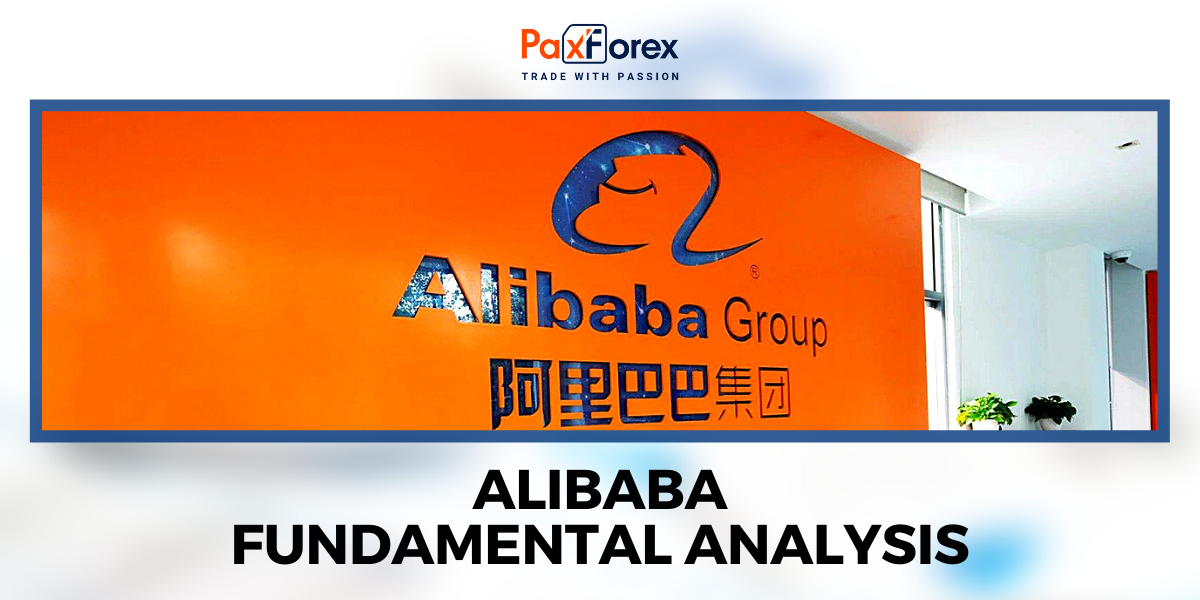
Source: PaxForex Premium Analytics Portal, Fundamental Insight
Alibaba, once a thriving force in the Chinese business landscape, has recently weathered a challenging period as its revenue growth hit an all-time low in the fiscal year concluding on March 31, 2023. This decline in financial performance has also driven Alibaba's stock price to levels not witnessed in recent years.
However, there are rays of hope in the latest quarterly results, as revenue growth is showing signs of picking up again, and profitability across its various divisions is improving. Has the worst passed for the company? More crucially, is it now an opportune time to consider buying Alibaba's stock?
This article will explore these pertinent questions.
Alibaba serves as a classic example of a fallen angel. After its IPO in 2014, it consistently achieved annual revenue growth exceeding 30%. Yet, the landscape drastically shifted over the past two years, with the company grappling with a series of challenges, including regulatory crackdowns by the Chinese government, a slowdown induced by the COVID-19 pandemic, and competition from platforms like Pinduoduo and Douying.
The fiscal year that concluded on March 31, 2023, bore the brunt of these challenges, with revenue growing by a mere 2%. More concerning was the 1% decline in revenue reported by Alibaba's flagship Chinese e-commerce business, which had traditionally been the primary revenue and profit generator for the company.
Such lackluster performance was deemed unacceptable for a corporation heavily reliant on e-commerce for its revenue and overall profitability.
Fortunately, there are indications that Alibaba's fiscal 2023 performance may have been an aberration. In the most recent quarterly results ending on June 30, 2023, the company witnessed a substantial 14% year-over-year growth in groupwide revenue, accompanied by a remarkable 70% surge in operating income. Notably, all major business divisions, excluding the cloud division, posted double-digit revenue growth. Even the flagship Chinese e-commerce division managed to achieve a 12% increase in revenue.
While it is early days to confidently declare victory, the recent performance suggests that Alibaba's strategic restructuring, which involves dividing its empire into six major units, is yielding positive results. All six divisions, in addition to reporting robust revenue growth, have demonstrated significant improvements in profitability. Particularly noteworthy are the turnarounds in the previously loss-making businesses of Cainiao Logistic and the Digital Media and Entertainment Group in the latest quarter.
Relying solely on one quarter of promising results may be premature. Nonetheless, Alibaba's strategic restructuring plan provides a clear path toward a complete recovery.
Alibaba's path to a complete business turnaround is undoubtedly well-planned, but it's important to recognize that such a transformation won't occur overnight. Quite the contrary, it will likely take several quarters, if not years, for the newly appointed management team to steer Alibaba back onto a high-growth trajectory.
In this endeavor, the recently instated Chairman and CEO, Eddie Wu, has embarked on a strategic shift with a focus on user satisfaction and harnessing artificial intelligence to drive the business forward. Simultaneous with Wu's appointment, Daniel Zhang stepped down from his role as chairman and CEO of Alibaba's cloud division. Clearly, Wu faces the challenge of delivering results in his dual roles as acting chairman and new CEO of the cloud division.
Investors should exercise patience and allow the new leadership team the time required to execute their turnaround strategies.
At the time of writing, Alibaba's stock is trading at around $86, which is only 26% higher than its initial public offering (IPO) price in 2014. Remarkably, the company's revenue has surged 15-fold during this period, soaring from $8.4 billion in 2014 to an impressive $126 billion in 2023.
The recent challenges Alibaba has encountered have led to pessimism among investors about its future prospects. Understandably, the stock is trading at a modest valuation, with a price-to-sales (P/S) ratio of 1.8, significantly below its five-year average of 5.5. For comparison, Pinduoduo boasts a P/S ratio of 6.2.
Considering these factors, Alibaba's valuation appears relatively attractive, particularly for a leading technology company that still holds some of China's premier businesses.
So, is Alibaba's stock worth buying?
The answer hinges on several factors. On one hand, there are early indicators that Alibaba is on a path to recovery, as evidenced by its respectable revenue growth in the latest quarter. Additionally, the stock is trading at an appealing valuation.
However, it's essential to bear in mind that the company will require time to regain its previous growth momentum. Investing in Alibaba's stock entails being comfortable with the inherent risks associated with Chinese companies, including political uncertainties.
Only those investors possessing the temperament to manage these additional risks and the patience to wait for the company to execute its latest strategies should consider purchasing the stock. Others may be best advised to remain on the sidelines.
As long as the price is above 83.00, follow the recommendations below:
- Time frame: D1
- Recommendation: long position
- Entry point: 86.94
- Take Profit 1: 94.00
- Take Profit 2: 101.00
Alternative scenario:
If the level of 83.00 is broken-down, follow the recommendations below:
- Time frame: D1
- Recommendation: short position
- Entry point: 83.00
- Take Profit 1: 79.00
- Take Profit 2: 75.00













